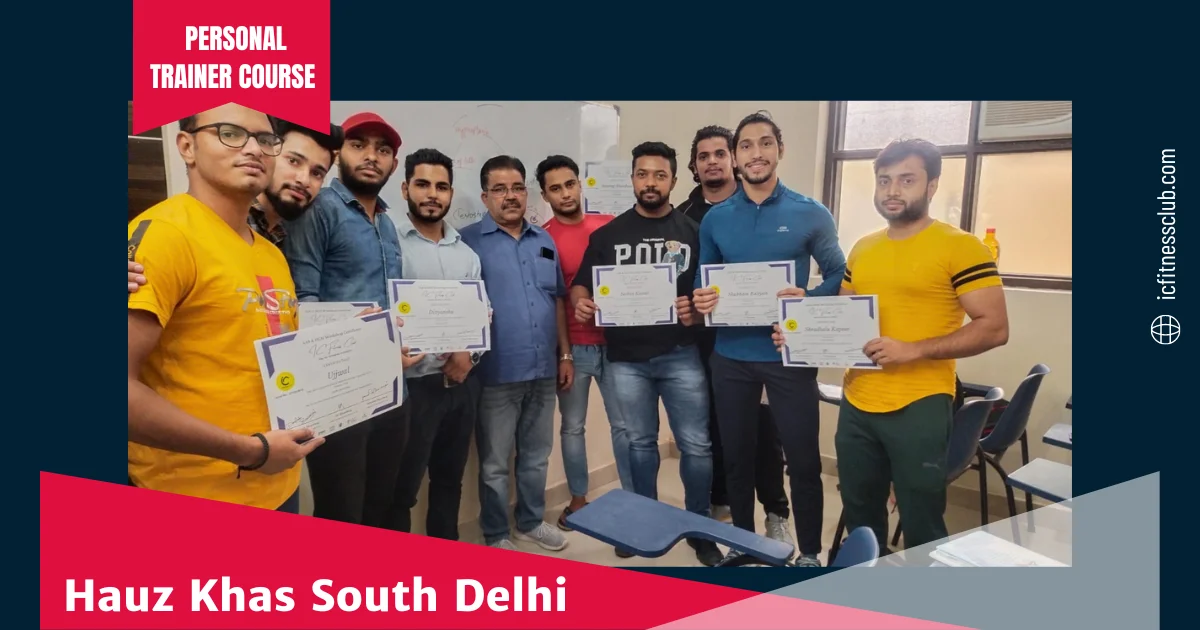Personal trainer Course Hauz Khas in South Delhi – IC Fitness Club
A personal trainer course in Hauz Khas South Delhi is a program designed to provide individuals with the knowledge, skills, and credentials needed to become qualified personal trainers. These courses cover topics such as anatomy, exercise physiology, nutrition, program design, and coaching techniques.
The goal of a personal trainer course is to provide trainers with the skills and knowledge needed to work with clients of all fitness levels and goals, from helping people lose weight and build muscle to working with athletes and specialized populations. The course is designed to equip individuals with the knowledge and skills needed to create effective, safe, and customized fitness programs for their clients.
Syllabus of Personal Trainer Course
The syllabus of a personal trainer course may vary depending on the program or institution offering it. However, here are some common topics that may be covered in a personal trainer course:
- Anatomy and Physiology: An in-depth study of the human body, including the skeletal, muscular, and nervous systems.
- Exercise Science: The scientific principles of exercise, including energy systems, types of muscle contractions, and the acute and chronic effects of exercise.
- Biomechanics: The study of the movement and mechanics of the human body, including proper exercise technique and injury prevention.
- Nutrition: The study of the role of nutrition in health and fitness, including macro and micronutrients, calorie requirements, and special diets.
- Fitness Assessment: Methods for assessing a client’s fitness level and creating a baseline for progress tracking.
- Program Design: Techniques for designing effective and safe workout programs, including periodization and progressions.
- Coaching and Communication: Effective communication strategies for working with clients, including motivational techniques and behavior change strategies.
- Special Populations: Techniques for working with clients with special needs, such as seniors, pregnant women, and individuals with chronic conditions.
- Business and Marketing: Strategies for building a successful personal training business, including marketing, sales, and client retention.
The above topics are not exhaustive, but they represent a general overview of what may be covered in a personal trainer course. It’s important to note that different courses and certification programs may place different emphases on each topic, so it’s important to research and choose a course that aligns with your interests and career goals.
Class Module of Personal Trainer Course
IC Fitness Club provides online and offline class module.
Online Class
- Video lectures: Online classes may include video lectures that students can watch at their own pace and time.
- Discussion forums: Online classes may have discussion forums where students can interact with their instructors and peers.
- Interactive exercises: Online classes may include interactive exercises, quizzes, and simulations to help students apply what they have learned.
- Online exams: Students may take exams online or submit assignments digitally.
- Webinars: Online classes may include live webinars with instructors or guest speakers.
Offline Class
- In-person lectures: Offline classes may have in-person lectures with instructors.
- Group discussions: Offline classes may include group discussions and activities.
- Hands-on exercises: Offline classes may include hands-on exercises, such as practicing exercises or assessing a client’s fitness level.
- Written exams: Students may take written exams or submit assignments in person.
- Guest speakers: Offline classes may include guest speakers who provide insights into the personal training industry.
Both online and offline class modules can provide valuable learning experiences for students, and it’s important to choose a course that aligns with your learning style and preferences.
Scope in the Fitness Industry
The fitness industry is a growing and evolving field with many career opportunities. Here are some areas of scope in the fitness industry:
- Personal training: Personal trainers work with individuals or small groups to help them achieve their fitness goals, such as weight loss, muscle gain, or improved athletic performance.
- Group fitness: Group fitness instructors lead classes in various activities such as yoga, pilates, dance, cycling, and more.
- Fitness management: Fitness managers oversee fitness facilities, including staffing, scheduling, and budgets.
- Sports coaching: Sports coaches work with athletes to help them develop their skills and improve their performance.
- Corporate wellness: Corporate wellness professionals develop and implement programs to promote health and wellness in the workplace.
- Fitness education: Fitness educators develop and teach courses for aspiring personal trainers, fitness instructors, and other fitness professionals.
- Physical therapy: Physical therapists work with individuals who have sustained injuries or have disabilities to help them improve their mobility and function.
- Sports medicine: Sports medicine professionals work with athletes to prevent, diagnose, and treat injuries related to sports and exercise.
The fitness industry continues to grow, and there is an increasing demand for qualified fitness professionals. As people become more health-conscious, the need for personal trainers, fitness instructors, and other professionals in the fitness industry is expected to continue to rise.




